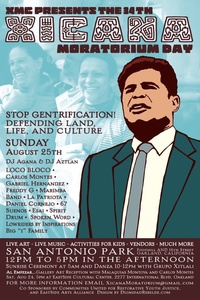 Oakland Chicano Moratorium March. July 26, 1970.On August 29, 1970 Chicano acti
Oakland Chicano Moratorium March. July 26, 1970.On August 29, 1970 Chicano acti Oakland Chicano Moratorium Flyer 1970vists held what became known as the National Chicano Moratorium against the Vietnam War and injustices that Chicanos were facing, including police brutality and systemic poverty and injustice. The main location was in East Los Angeles, were about 30,000 demonstrators converged in a rally held at Laguna Park (now Salazar Park). The LA County Sheriff attacked the protesters and 4 people lost their lives that day. The dead were: Ruben Salazar (a Los Angeles Times Chicano News reporter), Gustav Montag, Lyn Ward (member of the Brown Berets), and José Diaz. As a result of the deaths, protests occurred all over the country, including in Oakland. Previously, Oakland had seen marches on July 26, 1970 - the same day as 5,000 people marched in Houston. On May 13th of that year, 1000 students walked out in protest of the war.1 Participants at the August march included Antonio Rios Bustamante and Cassandra López.2
Oakland Chicano Moratorium Flyer 1970vists held what became known as the National Chicano Moratorium against the Vietnam War and injustices that Chicanos were facing, including police brutality and systemic poverty and injustice. The main location was in East Los Angeles, were about 30,000 demonstrators converged in a rally held at Laguna Park (now Salazar Park). The LA County Sheriff attacked the protesters and 4 people lost their lives that day. The dead were: Ruben Salazar (a Los Angeles Times Chicano News reporter), Gustav Montag, Lyn Ward (member of the Brown Berets), and José Diaz. As a result of the deaths, protests occurred all over the country, including in Oakland. Previously, Oakland had seen marches on July 26, 1970 - the same day as 5,000 people marched in Houston. On May 13th of that year, 1000 students walked out in protest of the war.1 Participants at the August march included Antonio Rios Bustamante and Cassandra López.2
There are anniversary protests in Oakland marking the Moratorium.
 Xicana(Chicano) Moratorium day Poster/Flyer for August 25th, 2013
Xicana(Chicano) Moratorium day Poster/Flyer for August 25th, 2013 Oakland Chicano Moratorium in front of Mary Help of Christian Church in Jingletown July 26 1970In Oakland there was a build up for the National Chicano Moratorium in Los Angeles. A collective of Chicano/Mexican-American and Latino activists and students from Oakland organized as the "La Raza Moratorium Committee". They organized the Chicano Moratorium march and Protest in East Oakland on July 26, 1970. The March started in Jingletown in front of Mary Help of Christians Church on East 9th Street and went down Fruitvale Ave and then Foothill Blvd. The march ended with a rally at San Antonio Park on Foothill blvd.
Oakland Chicano Moratorium in front of Mary Help of Christian Church in Jingletown July 26 1970In Oakland there was a build up for the National Chicano Moratorium in Los Angeles. A collective of Chicano/Mexican-American and Latino activists and students from Oakland organized as the "La Raza Moratorium Committee". They organized the Chicano Moratorium march and Protest in East Oakland on July 26, 1970. The March started in Jingletown in front of Mary Help of Christians Church on East 9th Street and went down Fruitvale Ave and then Foothill Blvd. The march ended with a rally at San Antonio Park on Foothill blvd.
Some of the guest speakers at the July 26th Oakland Chicano Moratorium were Rodolfo "Corky" Gonzáles (Chicano radical activist from Denver, Colorado), several activists from the Brown Berets, the Chicano Revolutionary Party, and La Raza Unida Party among others. It is said that 2,000 people came to the Oakland Chicano Moratorium shouting "Raza SÍ, Guerra NO" (Chicano/Mexican/Latino solidarity YES, War NO).
The Oakland Chicano Moratorium and its contributions to both the anti-war movement and the National Chicano Moratorium in Los Angeles were mostly forgotten from history until 2011. That year, a group of Chicano students and activists called the "Xicana Moratorium Day Committee" decided to bring the Chicano Moratorium back to San Antonio Park on August 27, 2011 as a memorial of the original Moratorium and as a way to bring awareness of problems still going on in the Latino/Chicano/Mexican community such as gang injunctions, immigration issues, violence, lack of services and inadequate schools in Oakland. The annual Xicana Moratorium Day event is now held in late August, usually in the last Sunday of August, at San Antonio Park.
 Flyer for the 2012 August 26 Oakland Xicana Moratorium
Flyer for the 2012 August 26 Oakland Xicana Moratorium Xicana Moratorium Day event August 31 2014// Photo courtesey of Sagnicthe Salazar
Xicana Moratorium Day event August 31 2014// Photo courtesey of Sagnicthe Salazar



